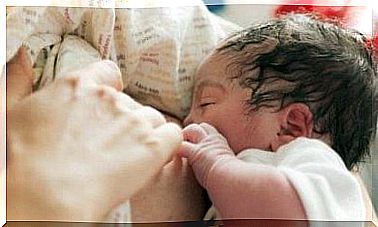The Nest Syndrome And How It Manifests Itself

During pregnancy, several stages are involved that involve great changes both physical and psychological. In the last few weeks there is usually a tendency to experience anxiety and stress due to the baby’s arrival. These are some symptoms of nest syndrome.
It is normal for mothers to worry about the needs of their babies who are about to be born, as they want the best for them right away, so all the moments experienced during the gestation period lose importance and just want to look after the little ones in the best possible way. But to do this, one must be ready to welcome the children. Let’s see together how the nest syndrome manifests itself .
The last weeks of pregnancy
Pregnancy lasts about 40 weeks, or nine months. During this time, a strong emotional bond is created between the mother and the baby. The last weeks of pregnancy are experienced with greater enthusiasm and uncertainty for the arrival of the newborn. During this very special time, it is common to experience the so-called nest syndrome.

During the last weeks of pregnancy, women ask themselves a lot of questions about motherhood, so they appear:
- Fears.
- Doubts.
- Insecurities.
- Concerns.
Such a delicate moment must be faced with the help of health professionals, with whom one must remain in contact throughout the pregnancy.
Thanks to some useful tips, you can get through the final moment of pregnancy in a calm and satisfying way, both for the mother and for the baby.
The nest syndrome
During the last few weeks of pregnancy, parents try to keep the situation under control. This is completely normal, as they are about to experience one of the happiest moments of their life. Towards the end of the gestation period, nest syndrome usually occurs in women, especially if they will become mothers for the first time.
This syndrome, also called “nest instinct”, consists in wanting to prepare everything for the arrival of the baby. This instinct makes logical sense, since from the moment the baby is born, almost all attention will be focused exclusively on him.
Nest syndrome can also be explained by biological reasons. There is a maternal hormone, called prolactin, responsible for the production of milk in the mammary glands, which influences the behavior of mothers, pushing them towards “nest preparation” and the protection of the baby.

First, the mother will want to have everything in order when she enters the hospital. But she will also worry about having the house equipped, so she will usually want to take advantage of the last few days of pregnancy to buy more clothes for the baby, the stroller, the crib, the changing table and other necessary utensils once the baby is born.
The woman also feels a strong need to clean, tidy up and tidy up the house in view of the baby’s arrival. Everything will have to be ready in the baby’s room. Despite this, it is recommended that the baby stay in bed with the parents for the first few months.
After that, he can sleep alone in his room, which should be simply furnished and decorated. In fact, the ideal would be to furnish it in an essential way and, as it grows, add toys, books, desk, etc.
Conclusions
It is worth pointing out that nest syndrome can be helpful in dealing with unforeseen events after the baby is born. It is very important that mothers, during the last stage of pregnancy, do not engage in dangerous activities or exert too much effort, as they must be rested to cope with the birth in the best possible way.
– Madline Tiger –









